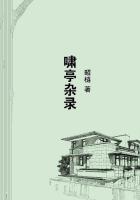It is well known that the grand seignior amuses himself by going at night, in disguise, through streets of Constantinople; as the caliph Haroun Alraschid used formerly to do in Bagdad.
One moonlight night, accompanied by his grand vizier, he traversed several of the principal streets of the city without seeing anything remarkable. At length, as they were passing a rope-maker's, the sultan recollected the Arabian story of Cogia-Hassan Alhabal, the rope-maker, and his two friends, Saad and Saadi, who differed so much in their opinion concerning the influence of fortune over human affairs.
"What is your opinion on this subject?" said the grand seignior to his vizier.
"I am inclined, please your majesty," replied the vizier, "to think that success in the world depends more upon prudence than upon what is called luck, or fortune.""And I," said the sultan, "am persuaded that fortune does more for men than prudence. Do you not every day hear of persons who are said to be fortunate or unfortunate? How comes it that this opinion should prevail amongst men, if it be not justified by experience?""It is not for me to dispute with your majesty," replied the prudent vizier.
"Speak your mind freely; I desire and command it," said the sultan.
"Then I am of opinion," answered the vizier, "that people are often led to believe others fortunate, or unfortunate, merely because they only know the general outline of their histories; and are ignorant of the incidents and events in which they have shown prudence or imprudence. I have heard, for instance, that there are at present, in this city, two men, who are remarkable for their good and bad fortune: one is called Murad the Unlucky, and the other Saladin the Lucky. Now, I am inclined to think, if we could hear their stories, we should find that one is a prudent and the other an imprudent character.""Where do these men live?" interrupted the sultan. "I will hear their histories from their own lips before I sleep.""Murad the Unlucky lives in the next square," said the vizier.
The sultan desired to go thither immediately. Scarcely had they entered the square, when they heard the cry of loud lamentations.
They followed the sound till they came to a house of which the door was open, and where there was a man tearing his turban, and weeping bitterly. They asked the cause of his distress, and he pointed to the fragments of a china vase, which lay on the pavement at his door.
"This seems undoubtedly to be beautiful china," said the sultan, taking up one of the broken pieces; "but can the loss of a china vase be the cause of such violent grief and despair?""Ah, gentlemen," said the owner of the vase, suspending his lamentations, and looking at the dress of the pretended merchants, "I see that you are strangers: you do not know how much cause Ihave for grief and despair! You do not know that you are speaking to Murad the Unlucky! Were you to hear all the unfortunate accidents that have happened to me, from the time I was born till this instant, you would perhaps pity me, and acknowledge I have just cause for despair."Curiosity was strongly expressed by the sultan; and the hope of obtaining sympathy inclined Murad to gratify it by the recital of his adventures. "Gentlemen," said he, "I scarcely dare invite you into the house of such an unlucky being as I am; but if you will venture to take a night's lodging under my roof, you shall hear at your leisure the story of my misfortunes."The sultan and the vizier excused themselves from spending the night with Murad, saying that they were obliged to proceed to their khan, where they should be expected by their companions; but they begged permission to repose themselves for half an hour in his house, and besought him to relate the history of his life, if it would not renew his grief too much to recollect his misfortunes.
Few men are so miserable as not to like to talk of their misfortunes, where they have, or where they think they have, any chance of obtaining compassion. As soon as the pretended merchants were seated, Murad began his story in the following manner:-"My father was a merchant of this city. The night before I was born he dreamed that I came into the world with the head of a dog and the tail of a dragon; and that, in haste to conceal my deformity, he rolled me up in a piece of linen, which unluckily proved to be the grind seignior's turban; who, enraged at his insolence in touching his turban, commanded that his head should be struck off.
"My father awaked before he lost his head, but not before he had lost half his wits from the terror of his dream. He considered it as a warning sent from above, and consequently determined to avoid the sight of me. He would not stay to see whether I should really be born with the head of a dog and the tail of a dragon; but he set out, the next morning, on a voyage to Aleppo.
"He was absent for upwards of seven years; and during that time my education was totally neglected. One day I inquired from my mother why I had been named Murad the Unlucky. She told me that this name was given to me in consequence of my father's dream; but she added that perhaps it might be forgotten, if I proved fortunate in my future life. My nurse, a very old woman, who was present, shook her head, with a look which I shall never forget, and whispered to my mother loud enough for me to hear, 'Unlucky he was, and is, and ever will be. Those that are born to ill luck cannot help themselves; nor can any, but the great prophet, Mahomet himself, do anything for them. It is a folly for an unlucky person to strive with their fate: it is better to yield to it at once.'
"This speech made a terrible impression upon me, young as I then was; and every accident that happened to me afterwards confirmed my belief in my nurse's prognostic. I was in my eighth year when my father returned from abroad. The year after he came home my brother Saladin was born, who was named Saladin the Lucky, because the day he was born a vessel freighted with rich merchandise for my father arrived safely in port.















